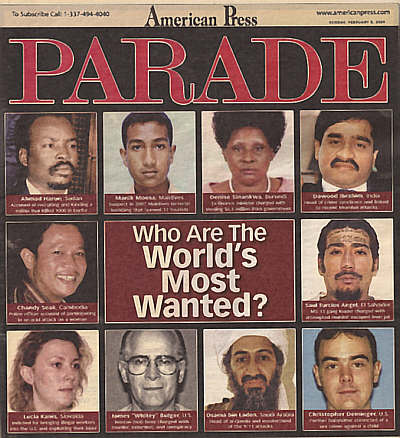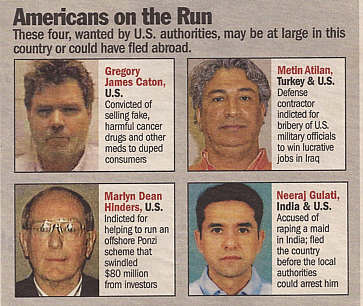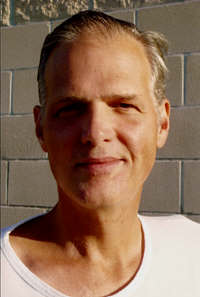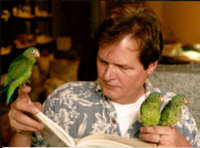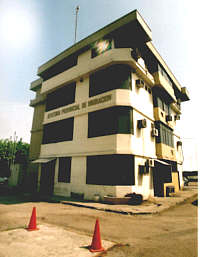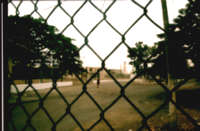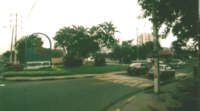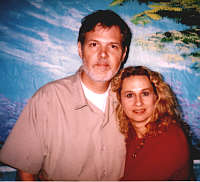 <
<
 >
>
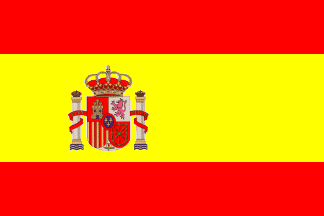 Leer este página en español
Leer este página en español
Chapter 3 -- continued
< --- Chapter 3, Section 2
My "Extraordinary Rendition" Back to the U.S.
& Subsequent Reimprisonment
Meeting With Top Ecuadorian Officials
 At about the time Cathryn and I
made the decision not to return to the U.S., I was approached by a good friend in
Guayaquil, Andrea Fernandez-Salvador. It is a well-known axiom in Latin America
that when it comes to
business and legal matters, "it isn't what you know, but who you know".
Therefore, I was encouraged to know that Andrea could arrange a meeting at the
government building in downtown Guayaquil to discuss my legal matters
with top government officials. At about the time Cathryn and I
made the decision not to return to the U.S., I was approached by a good friend in
Guayaquil, Andrea Fernandez-Salvador. It is a well-known axiom in Latin America
that when it comes to
business and legal matters, "it isn't what you know, but who you know".
Therefore, I was encouraged to know that Andrea could arrange a meeting at the
government building in downtown Guayaquil to discuss my legal matters
with top government officials.
 At the heart of my concerns was my
foreknowledge that a great deal of money had been paid, as I have detailed
in the previous segment, to trash my life. I was already well on my way
to establishing my permanent Ecuadorian residency; however, what I wanted was more
assurance that I wasn't going to be outright kidnapped for something as
trifling as a supervised release violation . . . especially when the supposed
violation was cooked up by a rogue FDA agent, the prosecutor's office
in Lafayette, and an employee who had
embezzled over $20,000 from my food company
(Lumen Foods). At the heart of my concerns was my
foreknowledge that a great deal of money had been paid, as I have detailed
in the previous segment, to trash my life. I was already well on my way
to establishing my permanent Ecuadorian residency; however, what I wanted was more
assurance that I wasn't going to be outright kidnapped for something as
trifling as a supervised release violation . . . especially when the supposed
violation was cooked up by a rogue FDA agent, the prosecutor's office
in Lafayette, and an employee who had
embezzled over $20,000 from my food company
(Lumen Foods).
 In the fall of 2007 a meeting was
held at the "Governor's Mansion" in Guayaquil for exactly this purpose.
Present at that meeting was
Gustavo Larrea, then Ecuador's Minister of Internal and
External Security
[1];
Camilo Samán, then the Governor of Guayas -- Ecuador's wealthiest province
and the hub of its commercial activities; the late Dr. Neville Solomon;
and Andrea, who acted as translator. In the fall of 2007 a meeting was
held at the "Governor's Mansion" in Guayaquil for exactly this purpose.
Present at that meeting was
Gustavo Larrea, then Ecuador's Minister of Internal and
External Security
[1];
Camilo Samán, then the Governor of Guayas -- Ecuador's wealthiest province
and the hub of its commercial activities; the late Dr. Neville Solomon;
and Andrea, who acted as translator.
 At the onset of the meeting, I explained
my circumstances, the focus of my work, my legal problems back in the U.S.,
and why my family moved to Ecuador to escape the nonsense. I then made it
clear that my ultimate objective was to obtain political asylum in Ecuador.
I told those present why I felt unsafe and why I was so concerned for the
safety of myself and my family. At the onset of the meeting, I explained
my circumstances, the focus of my work, my legal problems back in the U.S.,
and why my family moved to Ecuador to escape the nonsense. I then made it
clear that my ultimate objective was to obtain political asylum in Ecuador.
I told those present why I felt unsafe and why I was so concerned for the
safety of myself and my family.
 Mr. Larrea made it clear that asylum couldn't
be arranged, but that, in his mind, the larger issue was the nature of my
concern. "Do you really believe that over something this insignificant
the U.S. Government is going to go to all the trouble of having you
whisked away without following proper legal procedures and adherence
to the law?" Mr. Larrea made it clear that asylum couldn't
be arranged, but that, in his mind, the larger issue was the nature of my
concern. "Do you really believe that over something this insignificant
the U.S. Government is going to go to all the trouble of having you
whisked away without following proper legal procedures and adherence
to the law?"
 "Yes," I replied. "That's exactly what I'm saying." "Yes," I replied. "That's exactly what I'm saying."
 It was at that point that Larrea looked at me
as if I was certifiably insane. I might just as well have come to him with a plea
not to be executed for an overdue parking ticket. It was at that point that Larrea looked at me
as if I was certifiably insane. I might just as well have come to him with a plea
not to be executed for an overdue parking ticket.
 At this point Mr. Samán interjected that
residents of Ecuador had the same protection that naturalized citizens do. Any legal
action on the part of the U.S. Government would be subject to an extradition hearing
in the Ecuador . . . and only in the case that I had violated Ecuadorian law would
there be a problem. Moreover, Samán explained, if the U.S. attempted an illegal
kidnapping, the Ecuadorian military would be called in . . . at which point
Samán handed me his official "business card" with a private cell number on the reverse. At this point Mr. Samán interjected that
residents of Ecuador had the same protection that naturalized citizens do. Any legal
action on the part of the U.S. Government would be subject to an extradition hearing
in the Ecuador . . . and only in the case that I had violated Ecuadorian law would
there be a problem. Moreover, Samán explained, if the U.S. attempted an illegal
kidnapping, the Ecuadorian military would be called in . . . at which point
Samán handed me his official "business card" with a private cell number on the reverse.
 "If you ever have a problem, just call me." "If you ever have a problem, just call me."
 For readers who feel this is high talk coming
from officials of a small Latin American country, keep in mind that in Larrea's case,
this is the same official who would later state in commenting on Ecuador's refusal
to renegotiate the lease on the U.S. naval base in Manta,
"(the) United States would not accept another country's air base in its territory,
we won't either . . . we are a nation and we are sovereign." For readers who feel this is high talk coming
from officials of a small Latin American country, keep in mind that in Larrea's case,
this is the same official who would later state in commenting on Ecuador's refusal
to renegotiate the lease on the U.S. naval base in Manta,
"(the) United States would not accept another country's air base in its territory,
we won't either . . . we are a nation and we are sovereign."
 Some will say this is bold posturing.
All I can say is that all of the concerns I expressed to Mr. Larrea and Samán that
day would end up fully manifesting, exactly as I said they would. Some will say this is bold posturing.
All I can say is that all of the concerns I expressed to Mr. Larrea and Samán that
day would end up fully manifesting, exactly as I said they would.
The First Kidnapping Attempt
 At the end of 2007 Cathryn and I went to
the Pacific Coast to celebrate New Year's. I went on a ayahuasca journey on the 30th and
the next day we celebrated New Year's Eve. Although we felt somewhat settled in our new home,
I was still uneasy . . . as even by that time my life as an herbalist had taken me into
frequent shamanic journeys, during which I found myself becoming mildly clairaudient. At the end of 2007 Cathryn and I went to
the Pacific Coast to celebrate New Year's. I went on a ayahuasca journey on the 30th and
the next day we celebrated New Year's Eve. Although we felt somewhat settled in our new home,
I was still uneasy . . . as even by that time my life as an herbalist had taken me into
frequent shamanic journeys, during which I found myself becoming mildly clairaudient.
 I knew my adversaries would stop at nothing.
I just didn't know when. I knew my adversaries would stop at nothing.
I just didn't know when.
 It would take another ten and a half months to find out. It would take another ten and a half months to find out.
 On the afternoon of Wednesday, November 19, 2008, I was
travelling through the Andes, headed back to my home in Guayaquil. I had spent the day
working in Cuenca and was just about to "hit the Cajas"
[2] and lose my cellphone signal,
when I received the ominous call. On the afternoon of Wednesday, November 19, 2008, I was
travelling through the Andes, headed back to my home in Guayaquil. I had spent the day
working in Cuenca and was just about to "hit the Cajas"
[2] and lose my cellphone signal,
when I received the ominous call.
 It was Dr. Neville Solomon, calling from
Guayaquil. I could tell by his voice that something was urgent and terribly wrong.
Our conversation went something like this. It was Dr. Neville Solomon, calling from
Guayaquil. I could tell by his voice that something was urgent and terribly wrong.
Our conversation went something like this.
 "Greg . . . where are you?" "Greg . . . where are you?"
 "I'm driving through the mountains, just outside . . . " "I'm driving through the mountains, just outside . . . "
 "Never mind," he interrupted. "Just listen . . . and
whatever you do, don't drive home tonight. They're waiting for you." It was
at that point that he related how he had been abducted by U.S. officials working with the
police with National Migration . . . how they had thought that he was 'Greg Caton' . . . how they had
also abducted and terrorized Neville's 15-year-old son, Michael . . . and then let them
both go when they realized that not only had they abducted the wrong people, but that
they weren't going to get any useful information from those who were close to me. "Never mind," he interrupted. "Just listen . . . and
whatever you do, don't drive home tonight. They're waiting for you." It was
at that point that he related how he had been abducted by U.S. officials working with the
police with National Migration . . . how they had thought that he was 'Greg Caton' . . . how they had
also abducted and terrorized Neville's 15-year-old son, Michael . . . and then let them
both go when they realized that not only had they abducted the wrong people, but that
they weren't going to get any useful information from those who were close to me.
 The days that followed were both terrifying and
exhausting. Friends hid me as I changed residences and cellphones frequently. Whereas
officials who seemed so anxious to help previously, now could not be found or wouldn't
take my call. I even had a close doctor-friend call one of his own friends, a high-ranking
general in the Ecuadorian army. His advice? "This involves high-level U.S. officials.
Just stay out of it." The days that followed were both terrifying and
exhausting. Friends hid me as I changed residences and cellphones frequently. Whereas
officials who seemed so anxious to help previously, now could not be found or wouldn't
take my call. I even had a close doctor-friend call one of his own friends, a high-ranking
general in the Ecuadorian army. His advice? "This involves high-level U.S. officials.
Just stay out of it."
 For her part, Andrea and her daughter, watched
as Ecuadorian police waited outside the Caton's security fence, wearing black shorts
with big white letters that read, "FBI"
(wherein no such agency exists in the Ecuadorian government . . . just the U.S.). For her part, Andrea and her daughter, watched
as Ecuadorian police waited outside the Caton's security fence, wearing black shorts
with big white letters that read, "FBI"
(wherein no such agency exists in the Ecuadorian government . . . just the U.S.).
 What a contrast from Larrea's previous position:
"We are a nation and we are sovereign." What a contrast from Larrea's previous position:
"We are a nation and we are sovereign."
 In the days that followed, Dr. Solomon
filed a denuncio with the prosecutor's
office in Guayaquil, and used his contacts to discover that the license plate
of the vehicle used to abduct him (RYA-003) belonged to the U.S. Consulate's
Office in Guayaquil. In other words, the U.S. State Department. As months
passed and one official after another refused to discuss my case with
me, my attorneys, or my associates, we made the decision to move on. In the days that followed, Dr. Solomon
filed a denuncio with the prosecutor's
office in Guayaquil, and used his contacts to discover that the license plate
of the vehicle used to abduct him (RYA-003) belonged to the U.S. Consulate's
Office in Guayaquil. In other words, the U.S. State Department. As months
passed and one official after another refused to discuss my case with
me, my attorneys, or my associates, we made the decision to move on.
 In January, 2009, Cathryn and I moved to
Cuenca. In January, 2009, Cathryn and I moved to
Cuenca.
 It would be another year before we would
once again encounter kidnappers, but not before seeing my name
raised to "The World's Most Wanted" . . . It would be another year before we would
once again encounter kidnappers, but not before seeing my name
raised to "The World's Most Wanted" . . .
Gregory James Caton:
"World's Most Wanted Criminal"
 Less than three months after the
first kidnapping attempt, I received a somewhat frantic
call from an Alpha Omega Labs'
customer, who
asked me if I had seen the morning's Parade Magazine, dated Sunday, February 8, 2009.
[ See related
internet article or if deleted from the web,
click here (taken 12/12/11).] Less than three months after the
first kidnapping attempt, I received a somewhat frantic
call from an Alpha Omega Labs'
customer, who
asked me if I had seen the morning's Parade Magazine, dated Sunday, February 8, 2009.
[ See related
internet article or if deleted from the web,
click here (taken 12/12/11).]
 I said I hadn't and asked why it was important. I said I hadn't and asked why it was important.
 "It's important," came the reply, "because it says
here that you're on Interpol Red Alert . . . a status
reserved by Interpol for only the world's most serious, sought-after criminals; that
you're among the world's most wanted;
that you're a high-value target fugitive . . . hell . . . it's even got
you in here with Osama bin Laden.." "It's important," came the reply, "because it says
here that you're on Interpol Red Alert . . . a status
reserved by Interpol for only the world's most serious, sought-after criminals; that
you're among the world's most wanted;
that you're a high-value target fugitive . . . hell . . . it's even got
you in here with Osama bin Laden.."
 "You're making this up," I replied in complete astonishment. "You're making this up," I replied in complete astonishment.
 "No, I'm not . . . for real . . . Listen, I have your
email address here . . . Let me scan the cover plus the article and send it to you." "No, I'm not . . . for real . . . Listen, I have your
email address here . . . Let me scan the cover plus the article and send it to you."
 Not less than a couple hours later, I got the email,
showing me what was being represented by Parade Magazine. Not less than a couple hours later, I got the email,
showing me what was being represented by Parade Magazine.
 When I was able to find the internet article that
Parade had put out on me, I was even more amazed. I was the first in a lineup of persons
listed on their "World's Most Wanted," giving readers the distinct impression that
I was probably the most dangerous of them all. When I was able to find the internet article that
Parade had put out on me, I was even more amazed. I was the first in a lineup of persons
listed on their "World's Most Wanted," giving readers the distinct impression that
I was probably the most dangerous of them all.
 Even Osama bin Laden had nothing on a
probation violator, like me . . . except that this was not what was being represented.
Instead, under CRIME, what was stated was that I was "convicted of selling fake, harmful
cancer drugs and other meds to duped consumers," which is not at all what my coerced
plea agreement stated. Additionally, the unmistakeable impression that was transmitted was
that this was the CRIME for which I was being sought, which wasn't the case at all. Even Osama bin Laden had nothing on a
probation violator, like me . . . except that this was not what was being represented.
Instead, under CRIME, what was stated was that I was "convicted of selling fake, harmful
cancer drugs and other meds to duped consumers," which is not at all what my coerced
plea agreement stated. Additionally, the unmistakeable impression that was transmitted was
that this was the CRIME for which I was being sought, which wasn't the case at all.
 Even more apparent was that somebody at
the FDA had written this information, and Parade Magazine -- in the ignoble spirit of what
Paul Craig Roberts now calls "the press-titutes" -- dutifully published this information
without asking any questions, doing any research . . . and certainly not bothering to
contact me or anyone representing me. Even more apparent was that somebody at
the FDA had written this information, and Parade Magazine -- in the ignoble spirit of what
Paul Craig Roberts now calls "the press-titutes" -- dutifully published this information
without asking any questions, doing any research . . . and certainly not bothering to
contact me or anyone representing me.
 This wasn't news. This wasn't news.
 It was a U.S. Government-sponsored slander piece . . .
another hit job. It was a U.S. Government-sponsored slander piece . . .
another hit job.
 Here was yet more "PM" -- Perception Management --
the term that U.S. Government policy wonks use to describe the art of circulating
ridiculous, provably false
information, which is supposed to gather an air of truthfulness if only because it has
the stamp of officialdom. Here was yet more "PM" -- Perception Management --
the term that U.S. Government policy wonks use to describe the art of circulating
ridiculous, provably false
information, which is supposed to gather an air of truthfulness if only because it has
the stamp of officialdom.
 That the pending charge simply wasn't true, nor
did it exist, didn't appear to embarrass anyone in the U.S. Government. That the pending charge simply wasn't true, nor
did it exist, didn't appear to embarrass anyone in the U.S. Government.
The Second Kidnapping Attempt
& My Subsequent Rendition After
A Successful Extradition Hearing
 As we proceeded through 2009, I found
myself doing more and more shamanic work. Although Cathryn found no benefits
from taking entheogens -- even lamenting that besides vomiting and seeing bright lights
and geometric patterns she experienced nothing of lasting value -- my response
was entirely different.
[3]
I was able to consciously explore subtle layers of the universe,
meet and speak with plant spirits, and, on occasion and without volition, peer into
possible future events. For those who have not studied the range of possible
experiences using entheogenic substances, these statements may seem fantastical.
I myself initially explored entheogens are a legitimate branch of herbalism,
not expecting much. Since the 1970's, I had been a practitioner of transcendental
meditation and a student of Patanjali's yoga sutras -- all of which I found
to be consistent with my Christian upbringing and beliefs. I can state definitively,
however, that I never experienced the real fruits that these spiritual practices
are said to produce. The practice of the Siddhis -- in particular -- are said to
produce very specific "powers" and abilities over time . . . levitating . . . seeing
through objects . . . highly developed states of intuition, etc.; however, I never experienced
them to any significant degree. Perhaps such lack of performance can be attributable
to my own lack of spiritual development. Then, again, perhaps forty years of practice
isn't long enough to experience these abilities . . . after all, Vedic scholars and
knowledgeable yogis will tell you that it can take "lifetimes" of ditiful practice. As we proceeded through 2009, I found
myself doing more and more shamanic work. Although Cathryn found no benefits
from taking entheogens -- even lamenting that besides vomiting and seeing bright lights
and geometric patterns she experienced nothing of lasting value -- my response
was entirely different.
[3]
I was able to consciously explore subtle layers of the universe,
meet and speak with plant spirits, and, on occasion and without volition, peer into
possible future events. For those who have not studied the range of possible
experiences using entheogenic substances, these statements may seem fantastical.
I myself initially explored entheogens are a legitimate branch of herbalism,
not expecting much. Since the 1970's, I had been a practitioner of transcendental
meditation and a student of Patanjali's yoga sutras -- all of which I found
to be consistent with my Christian upbringing and beliefs. I can state definitively,
however, that I never experienced the real fruits that these spiritual practices
are said to produce. The practice of the Siddhis -- in particular -- are said to
produce very specific "powers" and abilities over time . . . levitating . . . seeing
through objects . . . highly developed states of intuition, etc.; however, I never experienced
them to any significant degree. Perhaps such lack of performance can be attributable
to my own lack of spiritual development. Then, again, perhaps forty years of practice
isn't long enough to experience these abilities . . . after all, Vedic scholars and
knowledgeable yogis will tell you that it can take "lifetimes" of ditiful practice.
 In any event,
that changed with my introduction to ayahuasca.
It was as if I had reconnected to an ancient part of my past. Despite the fact that
the bitterness of the finished preparation is such that I get nauseated at the very
thought of its taste
[4], I could not deny that I felt a kinship with
ayahuasca and the plant spirits to whom I was subsequently introduced. In any event,
that changed with my introduction to ayahuasca.
It was as if I had reconnected to an ancient part of my past. Despite the fact that
the bitterness of the finished preparation is such that I get nauseated at the very
thought of its taste
[4], I could not deny that I felt a kinship with
ayahuasca and the plant spirits to whom I was subsequently introduced.
 On the evening of Saturday, November 21, 2009 --
a year after the first kidnapping attempt -- I decided to take a shamanic journey
in the cloud forest near my home in Cuenca, at a place about 10,000 feet elevation.
I had an intuition that "something was trying to communicate," so I asked
Cathryn to come with me with pen and paper, so she could take notes. On the evening of Saturday, November 21, 2009 --
a year after the first kidnapping attempt -- I decided to take a shamanic journey
in the cloud forest near my home in Cuenca, at a place about 10,000 feet elevation.
I had an intuition that "something was trying to communicate," so I asked
Cathryn to come with me with pen and paper, so she could take notes.
 It was close to midnight when I began getting
thought impressions of a most disturbing nature. Among other things, I was told
in clear detail that: It was close to midnight when I began getting
thought impressions of a most disturbing nature. Among other things, I was told
in clear detail that:
(1) Another kidnapping attempt would happen soon; (2) That someone
close to me (who I won't name here) had provided extensive contact information
about me, my daily habits, travel plans, etc. in exchange for money; (3)
That, again (as if I really needed to be told this) corrupt elements within
the U.S. State Dept. were behind it, along with bribe-taking local police;
and (4) That as in the case of my
initial arrest on Sept. 17, 2003, and the first kidnapping attempt on
November 19, 2008, it would all happen on a Wednesday.
 The revelations were so disturbing
that I ended the entheogenic session and spent the rest of the night
talking to Cathryn. The revelations were so disturbing
that I ended the entheogenic session and spent the rest of the night
talking to Cathryn.
 Was it true? Was this something
we should rely or act upon? Or were these thoughts generated, like
dreams so often are, by my own hidden fears and concerns? If these
were just my own fears coming through, why were these communications
so specific? Was it true? Was this something
we should rely or act upon? Or were these thoughts generated, like
dreams so often are, by my own hidden fears and concerns? If these
were just my own fears coming through, why were these communications
so specific?
 For the next week, I stayed
very close to our apartment in the city. Cathryn made all the errands
required by our household. When November 25th (2009 -- the following Wednesday)
came and went, we began to feel that whatever I had been "picking up" was
without validity. We were still vigilant, but not as disturbed as before. For the next week, I stayed
very close to our apartment in the city. Cathryn made all the errands
required by our household. When November 25th (2009 -- the following Wednesday)
came and went, we began to feel that whatever I had been "picking up" was
without validity. We were still vigilant, but not as disturbed as before.
 Another week went by . . . it
was December 2nd (the following Wednesday), and we went about our work,
though I stayed home. At about 4 p.m. we finished up, and I told Cathryn
that maybe it was okay to head back to the mountains. Another week went by . . . it
was December 2nd (the following Wednesday), and we went about our work,
though I stayed home. At about 4 p.m. we finished up, and I told Cathryn
that maybe it was okay to head back to the mountains.
 For reasons I am uncertain, there are junctures
in our lives where fate takes hold . . . for no matter what preparations you have made
and what events preceed these critical junctures, the inevitable still happens.
That very morning, Cathryn had been on our mountain road . . . she had been pulled
over at a "partida"
[5] at a place where we never see one . . . in fact,
as I think back, there were all kinds of ominous signs that day that something
awful was looming, and, still, I ignored the warnings, even though I had even been
told what day of the week it would occur. It was as if entire sections of the brain
had been turned off . . . for me and for Cathryn. For reasons I am uncertain, there are junctures
in our lives where fate takes hold . . . for no matter what preparations you have made
and what events preceed these critical junctures, the inevitable still happens.
That very morning, Cathryn had been on our mountain road . . . she had been pulled
over at a "partida"
[5] at a place where we never see one . . . in fact,
as I think back, there were all kinds of ominous signs that day that something
awful was looming, and, still, I ignored the warnings, even though I had even been
told what day of the week it would occur. It was as if entire sections of the brain
had been turned off . . . for me and for Cathryn.
 As I drove down our mountain road near Cuenca after
business hours, I noticed a "partida" along a straight-away, which -- even then --
I took to be checkpoint for paperwork. In fact, as I pulled up to the stop,
I casually rolled down my window, and handed the officer my cedula, matricula,
and registration.
[6] Even then I had no thought that there
was trouble brewing. As I drove down our mountain road near Cuenca after
business hours, I noticed a "partida" along a straight-away, which -- even then --
I took to be checkpoint for paperwork. In fact, as I pulled up to the stop,
I casually rolled down my window, and handed the officer my cedula, matricula,
and registration.
[6] Even then I had no thought that there
was trouble brewing.
 As soon as the attending officer read my
cedula, "all hell broke loose." Other officers swarmed my vehicle and I was told
to get out. Stunned by the events moving quickly around me, I caught the word
"Interpol" by one of officers as another pulled out handcuffs . . . and then I knew. As soon as the attending officer read my
cedula, "all hell broke loose." Other officers swarmed my vehicle and I was told
to get out. Stunned by the events moving quickly around me, I caught the word
"Interpol" by one of officers as another pulled out handcuffs . . . and then I knew.
 "Wednesday," Cathryn muttered -- in a state
of near shock. "Wednesday," Cathryn muttered -- in a state
of near shock.
 As I was shoved into a police car and whisked
away, I held one prevailing thought -- a question, really -- about the events that
were unfolding . . . "Would I ever see my family again?" As I was shoved into a police car and whisked
away, I held one prevailing thought -- a question, really -- about the events that
were unfolding . . . "Would I ever see my family again?"
 That night I was driven to Guayaquil and
imprisoned, without being told what my charges in Ecuador were, without access to
a translator or legal counsel -- all of which are required by Ecuadorian law . . .
and without access to a phone so I could tell Cathryn what was happening. That night I was driven to Guayaquil and
imprisoned, without being told what my charges in Ecuador were, without access to
a translator or legal counsel -- all of which are required by Ecuadorian law . . .
and without access to a phone so I could tell Cathryn what was happening.
 In the days that followed, from my illegal
abduction on December 2nd to my actual rendition on an American Airlines Flight
on Friday, December 11th (2009), the number of laws that were broken in the name
of applying justice in my case only mounted. Even the customary medical examination
to new inmates in my case was completely
fake. (Dated on December 2, 2009 -- the day I was abducted -- the document
is signed by the attendant physician, Dr. José Velasco, a man I have never met.) In the days that followed, from my illegal
abduction on December 2nd to my actual rendition on an American Airlines Flight
on Friday, December 11th (2009), the number of laws that were broken in the name
of applying justice in my case only mounted. Even the customary medical examination
to new inmates in my case was completely
fake. (Dated on December 2, 2009 -- the day I was abducted -- the document
is signed by the attendant physician, Dr. José Velasco, a man I have never met.)
 In one
letter from my associate in Guayaquil to
Cathryn, dated Dec. 15th, there were already a potpourri of Ecuadorian laws broken,
all of which was equally puzzling to my defense attorney in Guayaquil, Dr. Dorlandig Humberto
Toala Quijije. The cruelest violation of all was the revocation of my
visa and cedula -- meaning, the complete and unlawful revocation of my Ecuadorian
residency. To this very day (Mar. 10, 2012) I cannot get an explanation as
to the legal basis for what is for me -- equivalent to taking away my natural
citizenship. Under "deportation" my migration report with the Ecuadorian
government is empty . . . further indication that what officials did was
illegal and they are now trying to cover their tracks. In one
letter from my associate in Guayaquil to
Cathryn, dated Dec. 15th, there were already a potpourri of Ecuadorian laws broken,
all of which was equally puzzling to my defense attorney in Guayaquil, Dr. Dorlandig Humberto
Toala Quijije. The cruelest violation of all was the revocation of my
visa and cedula -- meaning, the complete and unlawful revocation of my Ecuadorian
residency. To this very day (Mar. 10, 2012) I cannot get an explanation as
to the legal basis for what is for me -- equivalent to taking away my natural
citizenship. Under "deportation" my migration report with the Ecuadorian
government is empty . . . further indication that what officials did was
illegal and they are now trying to cover their tracks.
 The trendline, which pointed to no
end to law-breaking as it pertained to my case manifested early. [7]
The arresting officer, Capt. Wilson Reyes Pabon, of the Ecuadorian National Police,
who works inside the U.S. Consulate
in Guayaquil, filed a barrage of suspicious reports within
24 hours of my arrest. Most startling was the stated purpose of my arrest:
to support an arrest warrant issued the previous
October, which placed my criminal charge as "investigation." The trendline, which pointed to no
end to law-breaking as it pertained to my case manifested early. [7]
The arresting officer, Capt. Wilson Reyes Pabon, of the Ecuadorian National Police,
who works inside the U.S. Consulate
in Guayaquil, filed a barrage of suspicious reports within
24 hours of my arrest. Most startling was the stated purpose of my arrest:
to support an arrest warrant issued the previous
October, which placed my criminal charge as "investigation."
 That's right . . . investigation. That's right . . . investigation.
 Despite the fact that a
criminal background
investigation was issued the very same day I was arresting by the
Ecuadorian National Police, indicating
that there was NO VIOLATION of Ecuadorian law on record, it was still
necessary to arrest me under the presumable pretense that I needed to be
investigated. Despite the fact that a
criminal background
investigation was issued the very same day I was arresting by the
Ecuadorian National Police, indicating
that there was NO VIOLATION of Ecuadorian law on record, it was still
necessary to arrest me under the presumable pretense that I needed to be
investigated.
 The next day, on December 3th,
a hearing was held -- (I was not in attendance) -- wherein Ecuadorian
Judge Angel Rubio of the First Court of Constitutional Guarantees, the
same judge who issued the initial arrest "order" or warrant --
ordered
my release. His legal reasoning? There was no evidence of any violation
of Ecuadorian law, therefore there was no basis for extradition . . . .
deportation, perhaps. The next day, on December 3th,
a hearing was held -- (I was not in attendance) -- wherein Ecuadorian
Judge Angel Rubio of the First Court of Constitutional Guarantees, the
same judge who issued the initial arrest "order" or warrant --
ordered
my release. His legal reasoning? There was no evidence of any violation
of Ecuadorian law, therefore there was no basis for extradition . . . .
deportation, perhaps.
 This ruling didn't please
Capt. Wilson Reyes and his overlords at the U.S. Consulate. This ruling didn't please
Capt. Wilson Reyes and his overlords at the U.S. Consulate.
 A hearing was held the next day,
on December 4th, wherein the release order was acknowledged
but ignored. The prosecutor's office
had my Ecuadorian visa illegally
revoked and the order itself
was countermanded.
A hearing was held the next day,
on December 4th, wherein the release order was acknowledged
but ignored. The prosecutor's office
had my Ecuadorian visa illegally
revoked and the order itself
was countermanded.
 In response to this lawlessness,
my attorney filed an appellate
brief on the same day (Dec. 4th), followed by an
even more strongly worded brief on December 7th, following a negative
ruling by the Eighth District Court, favoring deportation.
A appellate hearing was set for December 14th. In response to this lawlessness,
my attorney filed an appellate
brief on the same day (Dec. 4th), followed by an
even more strongly worded brief on December 7th, following a negative
ruling by the Eighth District Court, favoring deportation.
A appellate hearing was set for December 14th.
 By this time, the level of lawlessness
and complete avoidance of any adherence to proper criminal procedure on
the part of those working on behalf of the U.S. Consulate had reached
such a fever pitch, that my attorney, Mr. Quijije, filed an
Action of Protection,
wherein he made the unusual claim that it appears that a "Black Hand"
was guiding the process, neutering any efforts to have the rule of law
applied in the case. By this time, the level of lawlessness
and complete avoidance of any adherence to proper criminal procedure on
the part of those working on behalf of the U.S. Consulate had reached
such a fever pitch, that my attorney, Mr. Quijije, filed an
Action of Protection,
wherein he made the unusual claim that it appears that a "Black Hand"
was guiding the process, neutering any efforts to have the rule of law
applied in the case.
 Mr. Quijije's fears were realized, for
on the very next morning, I was released from the Provincial Prison in Guayaquil
by Capt. Wilson Reyes under the pretense that I had an immediate hearing with
the judge. Mr. Quijije's fears were realized, for
on the very next morning, I was released from the Provincial Prison in Guayaquil
by Capt. Wilson Reyes under the pretense that I had an immediate hearing with
the judge.
 As in the case of all other consequential
areas of the case, this turned out to be a complete lie . . . I was, instead,
immediately taken to the international airport in Guayaquil and placed on an
American Airlines flight. As in the case of all other consequential
areas of the case, this turned out to be a complete lie . . . I was, instead,
immediately taken to the international airport in Guayaquil and placed on an
American Airlines flight.
 My deportation was acknowledged in
an internal
memo, drafted within an hour of my deportation . . . though subsequent
to this, any mention of deportation was removed from my Ecuadorian
immigration records. My deportation was acknowledged in
an internal
memo, drafted within an hour of my deportation . . . though subsequent
to this, any mention of deportation was removed from my Ecuadorian
immigration records.
My Additional 2-Year Prison Sentence in the U.S.
 Upon arriving in Miami, Florida,
I was personally delivered to the in-airport office of the
U.S. Marshal's Office. While awaiting my next journey -- to
the FDC (Federal Detention Center) in Miami -- Capt. Wilson Reyes
took time to have a party with U.S. Marshals, complete with
drinks and a photo opportunity. There is something
almost surrealistic about being treated like a big game prize
at the conclusion of an African Safari. At no moment to that
point was it more clear that the "fix was in" from the moment
I was kidnapped. That -- as I experienced in Judge Melancon's
court in 2004 -- any semblance of truth, an application of law,
simply had no bearing. What I had been dealing with all along
was the Mafia . . . Mafia with badges. Upon arriving in Miami, Florida,
I was personally delivered to the in-airport office of the
U.S. Marshal's Office. While awaiting my next journey -- to
the FDC (Federal Detention Center) in Miami -- Capt. Wilson Reyes
took time to have a party with U.S. Marshals, complete with
drinks and a photo opportunity. There is something
almost surrealistic about being treated like a big game prize
at the conclusion of an African Safari. At no moment to that
point was it more clear that the "fix was in" from the moment
I was kidnapped. That -- as I experienced in Judge Melancon's
court in 2004 -- any semblance of truth, an application of law,
simply had no bearing. What I had been dealing with all along
was the Mafia . . . Mafia with badges.
 I spent the next month
in Miami, at which point I was shipped off to a prison in
Breaux Bridge, Louisiana by way of Oklahoma City. Why Breaux Bridge?
Because it's only a stone's throw from Judge Melancon's courtroom
in Lafayette. Surely, U.S. authorities would not have gone through
all this trouble to have me illegally extradited if they couldn't
place me in close proximity to my tormenter . . . I spent the next month
in Miami, at which point I was shipped off to a prison in
Breaux Bridge, Louisiana by way of Oklahoma City. Why Breaux Bridge?
Because it's only a stone's throw from Judge Melancon's courtroom
in Lafayette. Surely, U.S. authorities would not have gone through
all this trouble to have me illegally extradited if they couldn't
place me in close proximity to my tormenter . . .
 The legal nonsense that
lead to Judge Melancon's assignment of yet ANOTHER prison sentence --
this time more two years -- yields official transcripts so voluminous
that a separate link table has
been created, making the transcripts available to those brave
souls who would care to peruse them. The legal nonsense that
lead to Judge Melancon's assignment of yet ANOTHER prison sentence --
this time more two years -- yields official transcripts so voluminous
that a separate link table has
been created, making the transcripts available to those brave
souls who would care to peruse them.
 From June 10, 2010 to
the end of March, 2011, I was housed at the Federal Correction Center in
Beaumont, Texas -- the same facility I had spent over 18 months
from 2004 to 2006. On March 31, 2011, I was picked up from Beaumont
by a good friend of my wife, Cathryn, and brought to the halfway
house in Lake Charles, where I served another five months of
administrative hell. From June 10, 2010 to
the end of March, 2011, I was housed at the Federal Correction Center in
Beaumont, Texas -- the same facility I had spent over 18 months
from 2004 to 2006. On March 31, 2011, I was picked up from Beaumont
by a good friend of my wife, Cathryn, and brought to the halfway
house in Lake Charles, where I served another five months of
administrative hell.
 Concurrent with my legal
entanglements in the States -- and thousands of miles away --
Cathryn was continuing to have my case reviewed by legal experts
in Ecuador. She was able to get notarized
affidavits of three people who personally witnessed the events
leading up to the illegal deportation, and an attorney in Quito
indicated that the violation of law was so massive that he
recommended a lawsuit
filed with the InterAmerican Commission on Human Rights in Washington, D.C.,
which he drafted. (A separate SUMMARY document
is enclosed which details the many laws that were violated
by those who perpetrated the kidnapping and deportation.) Concurrent with my legal
entanglements in the States -- and thousands of miles away --
Cathryn was continuing to have my case reviewed by legal experts
in Ecuador. She was able to get notarized
affidavits of three people who personally witnessed the events
leading up to the illegal deportation, and an attorney in Quito
indicated that the violation of law was so massive that he
recommended a lawsuit
filed with the InterAmerican Commission on Human Rights in Washington, D.C.,
which he drafted. (A separate SUMMARY document
is enclosed which details the many laws that were violated
by those who perpetrated the kidnapping and deportation.)
"You're Not Getting Your Passport Back" :
My Struggle To Return to My Family in Ecuador
 For the last four months
of my stay at the Lake Charles halfway house (called "CINC II"), I was
able to work at a job where I had steady access to internet communications
with Cathryn. For the last four months
of my stay at the Lake Charles halfway house (called "CINC II"), I was
able to work at a job where I had steady access to internet communications
with Cathryn.
 Even by mid-2011 it was becoming
increasingly apparent that a distinct, fascist, "martial law" atmosphere
was being created. We still had to wonder: "Would I be able to get back
to Ecuador?" Already, one of our friends who is an expert in the 'free
energy' movement was on a "No Fly List" and could not leave the U.S. Even by mid-2011 it was becoming
increasingly apparent that a distinct, fascist, "martial law" atmosphere
was being created. We still had to wonder: "Would I be able to get back
to Ecuador?" Already, one of our friends who is an expert in the 'free
energy' movement was on a "No Fly List" and could not leave the U.S.
 Would I now find myself on
a "No Fly List"? Would I now find myself on
a "No Fly List"?
 With our attention focussed on
my August 30th release date, we now had to wait to see how my efforts
faired in getting my U.S. passport renewed. With our attention focussed on
my August 30th release date, we now had to wait to see how my efforts
faired in getting my U.S. passport renewed.
 Aug. 30 --- At 9 a.m. on the morning of
Tuesday, August 30, 2011, I signed out of the halfway house and drove
a rental car directly to the Passport Center in Houston. On this day and
for the next three days that followed I would be commuting back and
forth between Lake Charles and Houston, 150 miles -- all in an effort to get my
U.S. passport renewed. When I got to Houston that Tuesday morning,
I paid for the State Department's "expedite service," and was told to return
the next day for my passport. Aug. 30 --- At 9 a.m. on the morning of
Tuesday, August 30, 2011, I signed out of the halfway house and drove
a rental car directly to the Passport Center in Houston. On this day and
for the next three days that followed I would be commuting back and
forth between Lake Charles and Houston, 150 miles -- all in an effort to get my
U.S. passport renewed. When I got to Houston that Tuesday morning,
I paid for the State Department's "expedite service," and was told to return
the next day for my passport.
 Aug. 31 --- The next day I dutifully returned
to Houston at the pre-arranged time only to be told that my passport "had been
held up by officials in Washington." So I then drove back to Lake
Charles and called the National Passport Information Center (NPIC), and
what followed was a conversation between myself and a NPIC
representative I will never forget . . . the most
critical moment of which went something like this: Aug. 31 --- The next day I dutifully returned
to Houston at the pre-arranged time only to be told that my passport "had been
held up by officials in Washington." So I then drove back to Lake
Charles and called the National Passport Information Center (NPIC), and
what followed was a conversation between myself and a NPIC
representative I will never forget . . . the most
critical moment of which went something like this:
---> NPIC Rep: "Let's see . . . oh, wait a minute . . . (long pause) . . .
My God, I've never seen a file like this . . . "
---> Greg: "I really need to know if I'm going to get
my passport this week. I have a flight scheduled for Friday,
so it's very important that I know what's going on . . . "
---> NPIC Rep: "Well, it says here that you're passport is being
held up by officials in Washington. I can't tell you if or
when you'll get your passport . . . (another long pause ensued) . . .
I'm not really sure we should be talking about this . . . (yet another long pause)"
---> Greg: "Would you mind if I spoke to a supervisor? . . .
You have a supervisor, right? . . . Is there a person there I can
talk to, to find out more about what's happening with my case?" . . .
---> NPIC Rep: "Hold on a moment. I'll transfer you." (another pause, after
which a woman answered the line)
---> NPIC Supervisor: "Hello, this is _________ , can I help you?" . . .
(at which point I summarized the conversation that I had had with
the NPIC rep) . . . "The rep should not have told you that . . .
what was his name?" . . . (at which point I discussed the name of
the rep I had spoken with) . . . "Well, everything is fine.
Your passport is being processed and you should get it soon."
 Given everything I had been through,
I knew the astonishing level of dishonesty that resides at all levels of
the U.S. federal government. So at the conclusion of this phone conversation
I had every reason to believe that the renewal of my U.S. passport was going
to be an extended affair. How could it be otherwise? Throughout this entire
ordeal, which from the day of my kidnapping to that present moment -- a span
of 21 months -- I had seen nothing but skullduggery. What would possess me to
believe that a man who could be placed in the public press on par with
Osama bin Laden could waltz into a government office and be treated like any
other citizen? Given everything I had been through,
I knew the astonishing level of dishonesty that resides at all levels of
the U.S. federal government. So at the conclusion of this phone conversation
I had every reason to believe that the renewal of my U.S. passport was going
to be an extended affair. How could it be otherwise? Throughout this entire
ordeal, which from the day of my kidnapping to that present moment -- a span
of 21 months -- I had seen nothing but skullduggery. What would possess me to
believe that a man who could be placed in the public press on par with
Osama bin Laden could waltz into a government office and be treated like any
other citizen?
 That evening I called Cathryn in Ecuador. Frustrated
and nearly exhausted to the point of tears, I told her that I would prepare
the rest of my meager belongings in Lake Charles and mail them off to Ecuador
in the morning before driving back to Houston. (It had been my intention to simply bring them back with me
on the plane.) It was truly apparent to me at that point that I had no
basis for hope and no way to know at what point in the future I would be
returned to my family -- despite there being no legal basis for denying
me the right to fly back to Ecuador -- to my home, my family, my friends, my property, my animals,
and my gardens. That evening I called Cathryn in Ecuador. Frustrated
and nearly exhausted to the point of tears, I told her that I would prepare
the rest of my meager belongings in Lake Charles and mail them off to Ecuador
in the morning before driving back to Houston. (It had been my intention to simply bring them back with me
on the plane.) It was truly apparent to me at that point that I had no
basis for hope and no way to know at what point in the future I would be
returned to my family -- despite there being no legal basis for denying
me the right to fly back to Ecuador -- to my home, my family, my friends, my property, my animals,
and my gardens.
 Sept. 1 -- The following morning,
for the third morning in a row, I headed off to Houston yet again. This time,
however, I was not headed for the Houston Passport Center. Instead, I drove
directly to the Consulate General
of Ecuador in Houston to try to unearth my current status with the
Ecuadorian government and find out if there could be another avenue to
returning home. Sept. 1 -- The following morning,
for the third morning in a row, I headed off to Houston yet again. This time,
however, I was not headed for the Houston Passport Center. Instead, I drove
directly to the Consulate General
of Ecuador in Houston to try to unearth my current status with the
Ecuadorian government and find out if there could be another avenue to
returning home.
 Eventually, I was able to meet with
the Consul General herself, Ms. Susana Alvear. Although my semi-functional
Spanish became an impediment to understanding everything that was said and
was occurring, the "take away" was that there was little that could be
done. It was apparent to me that officials in Quito whom Ms. Alvear spoke
with were familiar with my case, but there was an unmistakeable
sense that no one wanted to get their hands dirty by addressing it. Eventually, I was able to meet with
the Consul General herself, Ms. Susana Alvear. Although my semi-functional
Spanish became an impediment to understanding everything that was said and
was occurring, the "take away" was that there was little that could be
done. It was apparent to me that officials in Quito whom Ms. Alvear spoke
with were familiar with my case, but there was an unmistakeable
sense that no one wanted to get their hands dirty by addressing it.
 At the very moment a stopping point
arrived where I truly didn't know what more to think, do, or say, I got
a call on my cell phone while still sitting in front of Ms. Alvear. At the very moment a stopping point
arrived where I truly didn't know what more to think, do, or say, I got
a call on my cell phone while still sitting in front of Ms. Alvear.
 It was the Houston Passport Center. It was the Houston Passport Center.
 "Mr. Caton, your passport will be
here at 3 p.m. tomorrow for pickup . . . " I paused, and then I must have
asked at least three times in three different ways, "Are you sure?" "Mr. Caton, your passport will be
here at 3 p.m. tomorrow for pickup . . . " I paused, and then I must have
asked at least three times in three different ways, "Are you sure?"
 Astonished and relieved, I gracefully
exited the Consulate and headed back to Lake Charles to collect the few belongings
I had which had not yet been shipped off my mail. Then I made a most unexpected
call to Cathryn. Astonished and relieved, I gracefully
exited the Consulate and headed back to Lake Charles to collect the few belongings
I had which had not yet been shipped off my mail. Then I made a most unexpected
call to Cathryn.
 "Tomorrow is going to be very dicey.
I have to pick up my passport at 3 p.m. I still have a flight ticket that
leaves Houston a little before 6 p.m. I can only hope I'll be able to make
it on time." "Tomorrow is going to be very dicey.
I have to pick up my passport at 3 p.m. I still have a flight ticket that
leaves Houston a little before 6 p.m. I can only hope I'll be able to make
it on time."
 Since I still had my rental car
from Lake Charles, I had to make arrangements to bring a friend who would
drive back after dropping me off at the airport. And I had to hope for
a miracle, because the timeline before me was unbelieveably tight. Since I still had my rental car
from Lake Charles, I had to make arrangements to bring a friend who would
drive back after dropping me off at the airport. And I had to hope for
a miracle, because the timeline before me was unbelieveably tight.
 Sept. 2 -- The following morning
I spent a tearful breakfast with Fred [8], who
had provided me a job and a place to stay during my halfway house time.
Then I prepared to make my fourth trip to Houston in four days with my
"return trip" companion. Sept. 2 -- The following morning
I spent a tearful breakfast with Fred [8], who
had provided me a job and a place to stay during my halfway house time.
Then I prepared to make my fourth trip to Houston in four days with my
"return trip" companion.
 At 2 p.m. I showed up at the Houston
Passport Center, one hour early, attempting to make the case that I needed
to get my passport as soon as possible if I was to make my flight. As
it turned out, I was able to get my passport at 2:30 p.m., race to the airport
on time, and fly to Quito.
Although friends had warned me about the possibility
of not being allowed back into Ecuador, I was able to pass through immigration
without incident. As a tourist. At 2 p.m. I showed up at the Houston
Passport Center, one hour early, attempting to make the case that I needed
to get my passport as soon as possible if I was to make my flight. As
it turned out, I was able to get my passport at 2:30 p.m., race to the airport
on time, and fly to Quito.
Although friends had warned me about the possibility
of not being allowed back into Ecuador, I was able to pass through immigration
without incident. As a tourist.
 It was, of course, a joyful reunion
at Quito's international airport
where I met up with Cathryn shortly after
midnight after going on two years of separation. It was, of course, a joyful reunion
at Quito's international airport
where I met up with Cathryn shortly after
midnight after going on two years of separation.
 From there would begin the long,
arduous process of attempting to get my visa, my permanent residency,
reestablished . . . a process that continues to this day. From there would begin the long,
arduous process of attempting to get my visa, my permanent residency,
reestablished . . . a process that continues to this day.
 Aftermath: To this day,
I feel that it was only through the intervention of some kind soul I will
never meet in Washington who intervened, over the objections of
those connected to a lawless FDA, so that the law would observed and my
U.S. passport would be returned. Aftermath: To this day,
I feel that it was only through the intervention of some kind soul I will
never meet in Washington who intervened, over the objections of
those connected to a lawless FDA, so that the law would observed and my
U.S. passport would be returned.
 The final resolution to my
case in Ecuador is far more clear cut. On April 17, 2012, an
extraordinary session by Ecuador's Advisory Board of
Migration Policy was held. My extraordinary rendition and
deportation were ruled as having taken place without 'fundamentals' (i.e. legal foundation)."
This is a diplomatic way of saying that the activities of the
U.S. State Department and the U.S. Food & Drug Administration,
as it pertains to my case, were completely illegal. The final resolution to my
case in Ecuador is far more clear cut. On April 17, 2012, an
extraordinary session by Ecuador's Advisory Board of
Migration Policy was held. My extraordinary rendition and
deportation were ruled as having taken place without 'fundamentals' (i.e. legal foundation)."
This is a diplomatic way of saying that the activities of the
U.S. State Department and the U.S. Food & Drug Administration,
as it pertains to my case, were completely illegal.
 This ruling was further
reinforced by the re-issuance of my permanent residency visa
and "cedula" (i.e. national identification card) on September 12, 2012.
Such issuances would be impossible if Ecuador had found that
my deportation was legal. This ruling was further
reinforced by the re-issuance of my permanent residency visa
and "cedula" (i.e. national identification card) on September 12, 2012.
Such issuances would be impossible if Ecuador had found that
my deportation was legal.
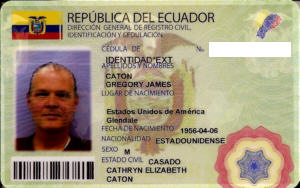
 It is a bittersweet victory
because it doesn't address the massive violations of law, morals,
and ethics that surround my case in the States. However, it is
probably the best outcome one can hope for, given the massive,
systemic government corruption that now guides the policies, procedures,
and activities of the United States -- domestically and around the world. It is a bittersweet victory
because it doesn't address the massive violations of law, morals,
and ethics that surround my case in the States. However, it is
probably the best outcome one can hope for, given the massive,
systemic government corruption that now guides the policies, procedures,
and activities of the United States -- domestically and around the world.

- Gustavo Larrea was no minor official. His official position
at that time could be equated to that of Secretary of State in the U.S. His influence
was considerable, and, in fact, he stated publicly that it was he, who in 2005,
first suggested that Rafael Correa run for the Presidency.

- "Cajas" is the abbreviated term used by locals around Cuenca
for the area known as Cajas
National Park.

- On more than one occasion, I have heard "ayahuasqueros" state that
"you don't choose ayahuasca . . . ayahuasca chooses you." I have acquired a richer understanding
of this expression over time. I have known dozens of people who have taken ayahuasca, or any
number of other entheogens to be found legal in Ecuador: San Pedro, guanto (a serious, and
occasionally deadly, Datura concoction that I would never take myself), not to mention mimosa
tree bark or other source materials that yield "smokeable DMT." Few of those I have known --
however well-intentioned or even well-prepared -- achieve the spiritual goals (if I may use
that term broadly) that they are seeking.

- Ayahuasca in our region of Ecuador is normally a cooked
combination of
"Banisteriopsis caapi"
(the celebrated "vine of the soul")
and "Diplopterys cabrerana,
known among the Chechua-speaking people as "chaliponga." See :
ayahuasca. However, even
in central Ecuador, there are dozens of "effective" recipes.

- A "partida" is an area of the road, marked off by orange traffic
cones, where the police will pull over passing cars to check vehicle registration
and ownership, look for contraband, etc.

- A "cedula" is the national identification card that is carried
by Ecuadorians, both citizens and permanent residents. Drivers are expected to keep
their "matriculas" in their vehicles, which, like registration cards in the U.S.,
indicates who the owner of the vehicle is, their address, and that taxes have
been paid on the vehicle.

- The links/documents that follow were only examined and properly
translated in early 2012. (Again, remember that after my kidnapping and deportation,
I did not return to Ecuador until September 2, 2011 . . . and it took months
to get my life back in order before re-addressing my legal matters.

- Fred is a pseudonym to protect the public identity of
the friend who acted as my benefactor, provided me with a job during my halfway
house time, and a beautiful cabin on the Calcasieu River to stay at, rent-free,
during this horrible ordeal.

|
A Pictorial of Key
Places, Events
& People
Click on pictures
below to ENLARGE.
 This section bookends the
major points made at
the beginnings of this chapter. In support, at the
end of this column the reader will find
a series of prison photos and brief case studies that provide further illustration.
Please note that all the inmates pictured are real. Their age and
release dates can be confirmed at www.bop.gov on the tab
marked "Inmate Locator." Just enter the respective inmate number,
which I provide below. [ Photo above: FCC Beaumont Low, Texas;
Fall, 2010].
Extraordinary Rendition:
December, 2009
 This picture was taken
in November, 2009, at my rented apartment in Cuenca,
just two weeks prior to my kidnapping and
illegal deportation from Ecuador. A shaman friend from
Puyo
had given me three parakeets -- a gift from deep inside the Amazon in
Pastaza Province. These birds must feel some kind of attachment
to their perceived owner, because all three managed to find a way
to leave my home shortly after I was taken.
 The "Jefatura Provincial
de Migracion" in Guayaquil carried a central role in both the
initial kidnapping attempt on November 19, 2007; the subsequent
kidnapping and illegal deportation in December, 2009; and
in more recent developments involving my case.

 On the morning of Friday, December 11, 2011,
I was escorted from Guayaquil prison by Col. Wilson Reyes of the
Ecuadorian National Police. The reason given? To see the judge who
would preside over my third hearing in less than nine days.
It was all a cruel ruse. Instead, I was promptly and illegally
taken to the international airport in Guayaquil
( José Joaquín de Olmedo International Airport)
and illegally deported on an American Airlines flight.
 This is the provincial prison in Guayaquil, known
as "Penitenciaria del Litoral." This is where I resided from Dec. 4, until
my illegal deportation on the morning of Dec. 11, 2011.
Known for its
corruption, I saw all manner of favors given to well-heeled inmates while
I stayed there. For the right price, you could obtain special food, marijuana,
prostitutes, cellphones, etc. as long as you knew the right guards and had the
money. The U.S. Consulate knows this and plays to the police culture in Guayaquil
to its own benefit. In my case there was a "right price" to having me kidnapped
and illegally deported over the objections of an Ecuadorian judge, having already
won my extradition hearing.
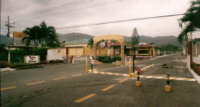
 At the time of the first
kidnapping attempt (Nov. 2008), Cathryn and I were living in a quaint neighborhood
outside Guayaquil -- on "Via a la Costa," the road taken by city
residents as they make their way to the Pacific Ocean.
It is called "Torres del Salado," and it was here that we lived
from the time we made our permanent move to Ecuador (Sept. 2007)
until February, 2009.
 Within 24 hours of the initial
kidnapping attempt, Ecuadorian police donning black shirts with large
white letters that read "FBI" were swarming Torres del Salado.
From a nearby neighborhood named "Puerto Azul" came
Andrea Fernandez-Salvador, who with her daughter, Sylvia, first observed
these police machinations. Over the following days where I had to
maintain an absence from my own home, Andrea was a frequent visit
to our house, as she continued to console Cathryn as these dramatic events
were unfolding.

 Life in a U.S. prison is so far
removed from Natural Law, so artificial and completely forsaken of
any connection with the Earth, that I craved to have my hands back
in the soil after I got to the halfway house. Within a week after
arriving, in April (2011), I was able to get a job with an old friend
and business associate, Fred [ 8], in
Moss Bluff
-- an affluent rural community just north of Lake Charles.
 I spent nearly five months, from early
April to September 2nd, living in a lovely cabin on the banks of
the Calcasieu River in Lake Charles.
 Although I had to have a full-time
job to stay at the halfway house, Fred also knew that I needed time to
heal before returning to Ecuador. At its deepest level, gardening is a
spiritual practice and a therapeutic modality. It reminds us of our roots and our connection to the
countless creatures that make up the universe of a healthy soil.
 Speaking of healthy soil, my
organic garden in Moss Bluff was a labor of love. When I started the soil was
covered with drought-tolerant grasses, rock-hard, clayish, with poor tilth and horrible structure. Although a friend
of Fred's did a rototill to get me started, the rest of it was done by hand.
With plenty of love and a little help from horse manure, greensand,
rock phosphate, and seaweed extract, I started the garden in early May
and by the end of August -- in four months -- I had a healthy garden
booming with hot peppers, squash, tomatoes, melons, pumpkin, cilantro, sunflowers,
beans, corn, and figs. This -- despite an unusually hot summer -- even for
a place like Moss Bluff, Louisiana in USDA Heat Zone 9.
 The photo below as taken on July 31st --
three months after I started the garden.

Vital
Documents
 Note: Note: Files below
are available in PDF format, followed by their DOCX ("Word")
equivalents.
 Summary of Criminal Acts
Summary of Criminal Acts
-- (DOC version) --
The violations
of both international and domestic (Ecuadorian) laws committed by the
U.S. Consulate and its agents in the Ecuadorian National Police were
so extensive that Cathryn Caton's attorneys had to compile their
own summaries. The file above includes an article written by the
late Ecuadorian journalist, Edgar "Patricio" Cardenas, for
El Mercurio
detailing particulars about the illegal deportation.
 Lawsuit Filing with the Inter American Commission on Human Rights
Lawsuit Filing with the Inter American Commission on Human Rights
-- (DOC version) --
-- This legal document, drafted
by Ecuadorian attorney, Roberto Moreno, in Quito, was composed in June, 2010,
and details, relative to the laws and jurisdiction of that international body,
the many violations that occurred in the "Caton case."
 Denuncio of Dr. Neville Solomon
Denuncio of Dr. Neville Solomon
-- (DOC version) --
Over a year prior to the illegal kidnapping and deportation, an initial attempt was made
involving the abduction of Neville Solomon, whose identity officials mistook for
that of Greg Caton. The shocking revelations made in this sworn statement provide
insights into events that would follow in 2009.
 Initial Ruling on Extradition -- Dec. 3, 2009
Initial Ruling on Extradition -- Dec. 3, 2009
-- (DOC version) --
This legal ruling was issued only hours after Caton was brought to Guayaquil
in the late hours of December 2, 2009. Its "essence"? Mr. Caton is free to go,
since he hasn't violated any laws we recognize. We can't extradite him, but we can give him
to the local police authority for processing and deport him, calling it something else.
 Witness Affidavits Concerning the Illegal Deportation
Witness Affidavits Concerning the Illegal Deportation
-- (DOC version) --
This document contains the sworn affidavits
of three eyewitnesses to the deportation -- one by the Defendant's own legal
counsel, and the other two by former associates of Herbologics, Ltd. -- the
primary business interest of the Caton family.
 Arrest Report & Related
Correspondence by Capt. Wilson Reyes
Arrest Report & Related
Correspondence by Capt. Wilson Reyes
-- (DOC version) --
A member of the Ecuadorian National
Police, Wilson Reyes, created several documents within 24 hours of the initial
kidnapping on December 2, 2009. Taken together, these documents and the events
that followed show that Wilson's allegiance at all times was to the dictates of
the U.S. Consulate and not to the Ecuadorian government, its statutues, or to
the rule of law in general.
 Arrest Order: Oct 2009
Arrest Order: Oct 2009
-- (DOC version) --
An illegal arrest order was issued two months before the kidnapping.
The charge? Investigation (?!?!) . . . a fact that only served to
perplex legal experts who would later examine the case.
 Criminal Background Check: Dec. 2, 2009
Criminal Background Check: Dec. 2, 2009
-- (DOC version) --
The supposed "investigation" was later shown to never exist and there was
never one subsequently initiated. On the same day as the arrest an criminal
background check on the Defendant (Caton) was made. The result? Nothing.
 Visa Cancellation: Dec. 4, 2009
Visa Cancellation: Dec. 4, 2009
-- (DOC version) --
One of the most egregious and lawless acts in connection with this case was
the illegal cancellation of the Defendant's visa after an unfavorable
ruling (in the eyes of the U.S. Consulate) wherein the Defendant was ordered
released.
 Hearing Summary: Dec. 4, 2009
Hearing Summary: Dec. 4, 2009
-- (DOC version) --
Less than 40 hours after the initial arrest, a hearing was held wherein it was made
clear that since an initial ruling was made denying extradition, a different route
would be executed by the prosecutor seeking deportation.
 Order Countermanded: Dec. 4, 2009
Order Countermanded: Dec. 4, 2009
-- (DOC version) --
This document provides further evidence that it was never the intent of those
secretly working for the U.S. Consulate to follow the law in this case.
 Defendant's Petitions Ignored: Dec. 4, 7, 10.
Defendant's Petitions Ignored: Dec. 4, 7, 10. Counsel for the Defendant made separate
petitions on December 4
-- (DOC) -- and
December 7
-- (DOC), with a final
Order of Protection
-- (DOC) -- filed on
December 10th when it finally became apparent that applicable laws were simply not going
to be followed in this case. The latest of these filings expresses a particularly
exasperated tone as it became clear that a "black hand" was
directing events
behind the scene.
 Results of Extraordinary Session
Results of Extraordinary Session
-- (DOC version) --
by Ecuador's Advisory Board of
Migration Policy held April 17, 2012. "The deportation
was without 'fundamentals' (i.e. legal foundation)."
U.S. Prison Life:
A Study in Surrealism
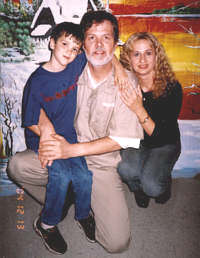
 The effects of prison life
as it is administered in the U.S. -- statistically, the world's largest
incarcerating authority by far (i.e. more DoubleSpeak: "land of the
free") -- is felt most severely not by the
inmate, but by the inmate's family. The wife, children, other dependents . . .
these are the individuals who are most deeply affected.
 This isn't an accident.
It was sadistically designed that way. In a criminal justice
system where truth had meaning -- where prosecutors were disincentivized
from presenting false evidence, forcing witnesses to say things
they knew were false, destroying exculpatory evidence, crafting
coerced plea agreements, etc. -- that same system would address
defendants who actually commited a crime with measures that
address the concerns of an actual victim. And the defendant
alone would be expected to provide recompense to the victim.
 The system will never
reform itself in this direction because such corrections would
expose the incorrigible corruption that is at the very heart of the system itself.
 The photo above was taken at
the visitation room of FCC Beaumont (Low), Texas on December 13, 2004.
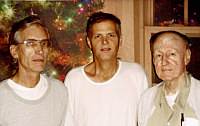
 Meet Philip Gerry (U.S. Federal
Inmate #60049-019; left) and Former Louisiana Senator Michael O'Keefe, Sr. (#17048-034; right).
 Gerry, an information technology specialist
and amateur sailor who circumnavigated the world on a sailboat he took ten years
to build, is a relative unknown. Caught up in the intrigue of another case where
a "confidential informant" provided false information about Gerry in order to
save himself, Gerry ended up being charged for a sex crime that never occurred.
Gerry has spent years trying to have his case re-examined after he was able to
unearth evidence that the testimony was completely perjured.
 Unlike Gerry, O'Keefe is not an unknown.
Federal agents have spent years working with the mainstream media to disgrace
O'Keefe and his entire family -- with charges ranging from insurance fraud,
wire fraud, mail fraud, to money laundering. Basically, the kitchen sink.
 All federal inmates -- even those who
are guilty of the crime for which they are charged -- know that the majority
of federal criminal cases exist on two levels: ( 1 ) The Overt Charge --
that is, the prosecutor's story that is presented to the public; and
( 2 ) The Actual Offense -- that is, the behind-the-scenes motivating
factor(s) that caused the government to target you in the first place.
 There are hundreds of pages on the internet
that go on, ad nauseum, about the "fall from grace" of former Louisiana President
of the Senate, Michael O'Keefe, and none that discuss what crimes were going on
at the highest levels of the FBI that O'Keefe attempted to uncover that constituted "The
Actual Offense." O'Keefe's real crime was not having the good sense to know
that there is a Shadow Government that is above the law . . . and there is no
crime more serious than attempts to uncover its machinations.
 People who have to scratch their heads
and wonder why U.S. Congressmen and Senators have worked so assiduously to
destroy the very Constitution they have sworn to protect, have only to
remember cases like those of O'Keefe. Either on the state or federal level,
legislators who want to survive the game don't rule anything.
 They do what they're told. They do what they're told.
 O'Keefe was writing his "tell all"
memoir when I last saw him in March, 2011, but since he is 80 years old,
has cancer and is being treated with conventional cancer drugs, the larger
question is whether or not he will make it to his April, 2016 "out date."
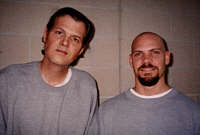
 Meet former U.S. Marine Lance Corporal Kevin M. Holt (#14325-045),
who is doing a life sentence for having stole a trailer with three of his Marine buddies.
 No, wait a minute. That's the Defendant's side of the story,
and we can only trust the Prosecutor. Let's start over.
 Holt was convicted
in 1993 by a court-martial board for the first-degree murder of decorated Desert Storm war
hero, Brent Arthurs. In 1993 at the young age of 21 years old, Holt was sentenced to
life in prison, narrowly escaping the death penalty.
Actually, he did way more just commit murder. He stabbed his
friend 45 TIMES with a bayonet, stole his motorcycle and other possessions, then he went back
to base, displayed the stolen goods while advertising and bragging about the theft and the gruesome killing in exhaustive, graphic detail.
Not satisfied to have already committed a crime on par with the grossest Hollywood horror movie, he then attempts
to convince his listeners to join him in committing yet another similar act . . .
 Hey, stop rolling your eyes. It's totally plausible . . . I see it happen all the time.
 You see, that's what we're supposed to believe.
 That's the story.
 That's the Overt Charge.
 Did it actually happen? . . . To be honest,
I have no earthly idea. I wasn't there. But what I do find curious is that the
U.S. Government has repeatedly denied the admission of DNA evidence in the case.
 For years, Holt's mother, Ms. Glenda Ewing, maintained
a website at her own expense called militaryinjustice.com, where she attempted
to bring to light the facts of the case -- the most important of which is the claim
that it wasn't even possible for Holt to have been in the area where Brent Arthurs
was killed. Several people testified
that they saw Arthurs ALIVE after the government claims he was killed, and in February, 2013,
I received a letter from a friend of Holt
that recounted prosecutor fraud in
connection with the case.
 I didn't know Holt very well, but I found the
U.S. Government's efforts to suppress evidence every bit as disturbing as the facts
of the murder itself -- regardless of who did it . . . if it happened at all.
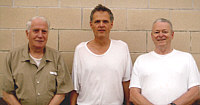
 Meet former Danish assemblyman and United Nations delegate from Denmark, Uwe Jensen (#15926-179, left); and his
"cellie," arms maker and military contractor, Robert Stewart (#04650-081, right). Actually, the charges of both men have to do with arms.
 They seem like very nice guys, but no citizen should ever forget that they're terrorists. In fact,
Uwe -- despite his illustrious reputation and career back in Denmark -- is regarded as such a threat that he is not allowed to
receive mail unless it has been translated, read, and analyzed PRIOR to receipt. So if you write him today, it could be many
weeks before he reads it. He's a serious threat.
 Yup. That's the story.
 That's what we're supposed to believe.
 I'm sure that Uwe's charges have nothing to do with the fact that Eric Holder,
currently head of the U.S. Dept. of Justice and a never-to-be-indicted architect in the
Operation Fast & Furious
arms scandal in Mexico, was -- at that time -- representing an arms dealer in Colombia that was a
competitor to Uwe's company. (Hear
57 Congressional calls for Holder's never-to-be-seen
resignation).
 A mere coincidence . . . I'm sure . . . because we can
trust that the motives of prosecutors and their handlers are pure.
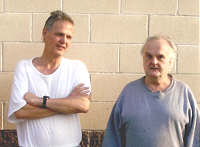
 Meet Canadian physician, James T. Hill, M.D. (#13040-035), 64, a practitioner
who emphasized natural healing, vitamin and mineral supplementation, prescribed herbs, and considerable care before
recommending pharmaceutical drugs to his patients. In fact, Dr. Hill offered courses in natural medicine and
nutrition at FCC Beaumont Low that were approved by prison authorities! (I know -- because I took two of his
courses while at that prison.)
 That's his Actual Offense.
 Paradoxically, his Overt Charge was making prescriptions to
some of his desperate patients by phone, without seeing them in person.
 His current release date is in August, 2020.
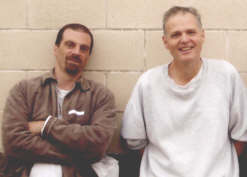
 Meet Douglas B. Spink (#35132-086), 40, amateur marijuana grower.
His Covert Offense? Doug is a world-class programmer and cryptologist who founded www.CryptoCloud.com, an VPN service
that provides its clients a level of cryptologic protection well above that currently available from comparable
services. He is not well-liked among the intelligence agencies.
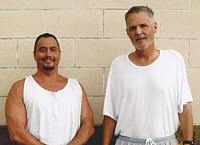
 Meet Ralph Anthony Knox (#34441-044), 43, small-time methamphetamine
producer. I knew about "Tony's" case fairly well because he was my cellmate ("cellie"), and I had a chance to
review his transcripts. Tony never attempted to argue -- to anyone -- that he didn't violate the
law by making certain things in his own home that aren't legal.
 His problem was the complete abandonment of the 4th Amendment
as it applied to his case. Tony was able to show the court that the local sheriff had used a
judge's signature stamp without their approval. Apparently, no one in authority in
Lincoln County,
Missouri has a problem with unreasonable search and seizure. This, of course, is consistent
with the U.S. federal government's current posture that, "We can violate any law or constitutional
principle we want if we think that a citizen of this country has committed a crime."
 Speaking of "drugs" that are not legal. It is well-known
in the federal prison system, where over 50% of all inmates are there because of convictions
that, in some way, involved drugs, that the system is rigged. According to former U.S. assistant
secretary of HUD, Catherine Austin
Fitts, the CIA's international cocaine trade exceeds $600 billion a year in gross receipts.
 If you're in a U.S. prison for dealing in illegal drugs,
it isn't because the U.S. government has a moral or ethical problem with the distribution of
cocaine, heroin, methamphetamines, marijuana, or any other "controlled substance."
 It's because they didn't get their cut.
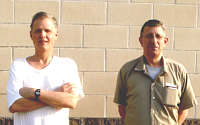
 Meet Kevin Felts(#45128-079), a professional pilot, who used his
private jet to fly wealthy clients to far-flung locations with very short notice. One of the side effects
of having an "Office of Asset Forfeiture" at the U.S. Dept. of (In)Justice, whose job it is to
shake down each and every defendant for whatever assets they can find, is that collateral damage
is inevitable.
 Had Kevin taken the time to examine the contents of
everything his clients carried, he wouldn't be in prison today. With that level of "TSA style"
invasiveness, it is doubtful that he would have had happy clients, but then he wouldn't be in prison.
 Of all the inmates I knew at Beaumont, Kevin was among the
most bitter. He had invested all of his faith in what he thought was a just system . . . played
by the rules . . . paid all his taxes, etc. It is a hard lesson to learn that the world is nothing
at all like you think.
 Kevin's current out date is February 23, 2023.
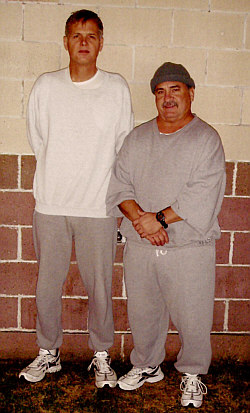
 Meet Walter Velez (#83306-180), formerly a reseller
of marijuana, but currently imprisoned for having a gun in his home.
 Few Americans appreciate the degree to which
the 2nd Amendment -- that simple, basic, civil liberty that allows one to
protect one's family -- has been emasculated to the point of obscurity. The
Amendment itself -- just one sentence long -- is simple and to the point:
" "A well regulated Militia,
being necessary to the security of a free State, the right of the people to keep
and bear Arms, shall not be infringed."
 People like Walter Velez, who number in the
many thousands, are a living
testament to the fact that this right is currently being massively infringed.
 Opposition to civil liberties is not
new. Even the Federalist Papers,
published in 1788, took a generally negative view of what would come to be known
as "The Bill of Rights." Nonetheless, after its passage, the Bill of Rights was --
for generations -- regarded as quintessentially American. Indisputable and
indefilable. Its absence would constitute nothing more definably UN-American.
 Not today.
 Acting on the orders of a virulent
Shadow Government, that expansive coast-to-coast brothel known as the federal
court system has seen to it that, piece-by-piece, the U.S. Constitution is
completely dismantled. True and faithful constitutionalists, like
former Judge Joseph Napolitano, author of
Constitutional Chaos:
When the Government Breaks Its Own Laws and
Its Dangerous to
Be Right When the Government is Wrong: The Case for Personal Freedom, has been
railing against these dangerous developments for years -- to little effect.
(He was recently
fired from Fox News
for a brilliantly oblique, poignant diatribe.)
 This issue is particularly close to me, because
at the time of my initial arrest on September 17, 2003, the initial charge was going
to be the same as Walter Velez. Back in 1999, my wife legally obtained registered
firearms, and as a result of concerns about the possibility of civil unrest over the
Y2K phenomenon, she stocked up and kept everything in a private locker. We were not
private about this. In fact, many of the firearms were purchased by a Lake Charles
Police Lieutenant and gun store owner, named Keith Holland. All were proper registered
with the U.S. Government.
 Not good enough -- said the Lafayette prosecutor,
who later dropped the gun charges against me because the FDA was insistent on pressing
their charges, which at that time appeared to present the prosecution with a
heftier prison sentence against me.
|

